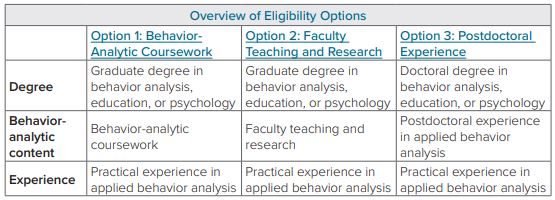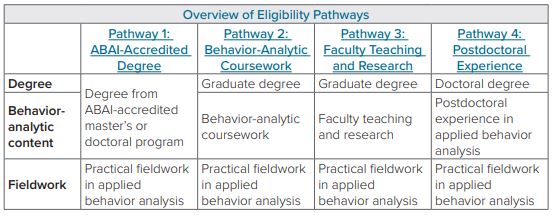Board Certified Behavior Analysts (BCBAs) are highly-trained and skilled individuals with a desire to help people with developmental disabilities and behavior disorders lead more fulfilling lives. Whether you’re already certified and looking for a new job or are a college student wondering how to become a BCBA in California, you’ve come to the right place.
Keep reading to learn the requirements of becoming certified in Applied Behavior Analysis (ABA). Then, call us to inquire about an open position or to learn more about our organization.
How long does it take to become a BCBA?
Depending on your graduate course of study and how long it takes for you to complete your undergraduate and graduate degrees, you can expect to be certified as a BCBA within six to eight years.
Generally, it takes four years to earn a Bachelor’s degree, two to earn a Master’s, and usually at least a year to complete the required 1,500 hours of fieldwork.
How to Become BCBA Certified in CA
Receiving BCBA certification in California is a rigorous process, but the opportunity to help countless children and their families is worth every minute.
Not just anyone can become a BCBA therapist. You must demonstrate to the Behavior Analyst Certification Board (BACB) that you are proficient in Applied Behavior Analysis (ABA) techniques and that you are knowledgeable about developmental disabilities like autism spectrum disorder (ASD).
To receive BCBA certification, you’ll need to meet four main requirements in the areas of education, leadership, and testing. Below, we break down those four components of what is BCBA certification and provide tips on meeting requirements the first time.
Requirements
1. Graduate Degree in a Relevant Field
To fulfill the first of two educational requirements, you’ll need to earn a Master’s, doctorate, or Ph.D. in a relevant field from an accredited institution. Relevant fields include psychology, education, or behavior analysis, although other fields may also be accepted.
You can find a list of accredited institutions in the Council for Higher Education Accreditation online directory.
BCBA educational requirements are more accessible than ever before. Individuals with young children or who have financial limitations may find an online program to be suitable. Browse the most affordable online BCBA degree programs here.
Another helpful resource is the Applied Behavior Analysis International (ABAI) Accreditation Board website. There, you can find a full list of accredited universities with doctoral and Master’s programs. California State University, Los Angeles offers a stellar program for individuals wanting to stay in-state.
Important note: If you apply for certification after January 1, 2022 using a graduate degree from an accredited program, both your degree and coursework requirements will be met.
2. Relevant Coursework
As you earn your degree, you’ll need to complete 270 classroom hours of graduate-level coursework in five areas:
Ethical and Professional Conduct
You must complete 45 hours of coursework in this area, which should be taught based on the BACB Professional Disciplinary and Ethical Standards and the BACB Guidelines for Responsible Conduct for Behavior Analysts.
Concepts and Principles of Behavior Analysis
You must complete 45 hours of coursework in this area, which should be taught based on the BACB Foundational Knowledge List.
Research Methods in Behavior Analysis
You’ll complete 45 hours of coursework in this area – 25 hours of Measurement, including data analysis, and 20 hours of Experimental Design. This coursework should be taught based on the BACB Fourth Edition Task List.
Applied Behavior Analysis
You must also complete 105 hours of Applied Behavior Analysis (ABA) content based on the BACB Fourth Edition Task List: 45 hours in Fundamental Elements of Behavior Change and Specific Behavior Change Procedures; 30 hours in Identification of the Problem and Assessment; 10 hours in Intervention and Behavior Change Considerations; 10 hours in Behavior Change Systems, and 10 hours in Implementation, Management, and Supervision.
Discretionary
Lastly, you’ll have an allowance of 30 discretionary hours for instruction in areas where you may need extra focus or attention.
Earning Hours
If you’re applying for BCBA certification before January 1, 2022, you can obtain the required coursework through an ABAI-accredited graduate program or a Verified Course Sequence.
You can find a directory of Verified Course Sequence-supported programs here.
Important note: If you apply for certification after January 1, 2022 using a graduate degree from an accredited program, both your degree and coursework requirements will be met.
3. Supervised Experience
Once you’ve started your BCBA coursework, you’ll secure a qualified supervisor to lead you through the next requirement, supervised experience. You must choose a supervisor who is:
- A BCBA/BCBA-D in good standing who has been certified for at least one year and meets an ongoing supervision requirement, or a BCBA/BCBA-D in good standing who has been certified for less than one year and is receiving monthly consultation from a qualified supervisor, OR
- A licensed or registered psychologist who is certified by the American Board of Professional Psychology in Behavioral and Cognitive Psychology, OR
- An ABAI Verified Instructor.
Once you have a supervisor, you’ll both write and sign a contract to protect both parties and align fieldwork goals. Then you’ll begin your fieldwork, of which there are two types: Supervised Fieldwork, which requires 2,000 hours to qualify, and Concentrated Supervised Fieldwork, which requires 1,500 hours to qualify.
For more information about combining fieldwork types and accruing hours, consult the official BCBA Fieldwork Standards guide.
4. BCBA Exam
After all the studying, coursework, and supervision, you’re finally ready to prove your knowledge and take the BCBA exam. As soon as you pass the exam, you immediately earn your title of BCBA.
The process begins by applying to take the exam. Once you’ve been authorized, you’ll start studying (don’t skip this step!). Sample questions and task lists are provided on the BACB website. You can access information about remote testing options, rescheduling and consolation policies, and more on the Pearson Vue website.
The exam is administered online at a Pearson Vue testing center. You’ll have four hours to complete the exam, which includes 160 questions. You’ll receive your result as soon as you finish. If you did not pass, you have the option to retake the exam. In fact, you have eight chances to take the exam (seven retakes) within two years of your exam authorization.
It’s in your best interest to study hard and try to pass the exam on your first try. This way, you’ll be able to start working as soon as possible, and you’ll save money on testing fees (not to mention the headache of rescheduling). As you can see, BCBA certification in California can be a long process, but you can begin work immediately as soon as you complete the last step.
Tracks to Achieve Requirements
We’ve included a convenient chart from the BACB to guide you through the certification process. There are three paths to achieve the requirements if you’re applying before January 1, 2022. The first option (Behavior-Analytic Coursework) is the most common.
If you’re applying for certification after January 1, 2022, you have four pathways to fulfill the requirements. A chart is included below for your convenience.
After You Achieve BCBA Certification, Call Us
With some of the best autism programs in California, Therapeutic Pathways prides itself on hiring the best and brightest BCBA therapists.
Don’t let the duration of the certification process intimidate you; the requirements may seem like a lot, but in the end, you’ll have a valuable certification that opens doors and provides the opportunity to help countless children and their families lead better, more fulfilling lives.
Call us to learn more about the BCBA certification requirements or view our open positions. We can’t wait to hear from you!
 Listen to Our Podcast
Listen to Our Podcast

